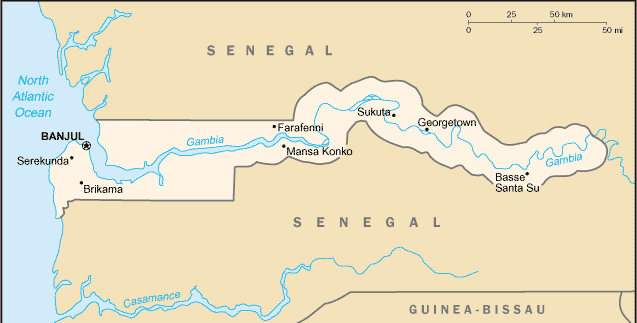 |
usa | world | animals | vocabulary | health | science | math | history |
Gambia
Map Courtesy CIA World Factbook The Republic of The Gambia is a country in West Africa. It is the smallest country within the African continent and is entirely surrounded by Senegal, with the Gambia River emptying into the Atlantic Ocean in its center. In 1965, The Gambia became independent from the British Empire. Banjul is its capital. Gambia was once part of the Empire of Ghana and the Songhai Empire. The first written accounts of the region come from records of Arab traders in the 9th and 10th centuries A.D. Arab traders established the trans-Saharan trade route for slaves, gold, and ivory. In the 15th century, the Portuguese took over this trade using maritime routes. At that time, The Gambia was part of the Mali Empire. In 1588, the claimant to the Portuguese throne, Antonio, Prior of Crato, sold exclusive trade rights on the Gambia River to English merchants; this grant was confirmed by letters patent from Queen Elizabeth I. In 1618, King James I granted a charter to a British company for trade with The Gambia and the Gold Coast (now Ghana). During the late 17th century and throughout the 18th, England and France struggled continuously for political and commercial supremacy in the regions of the Senegal and Gambia Rivers. The 1783 Treaty of Versailles gave Great Britain possession of The Gambia, but the French retained a tiny enclave at Albreda on the north bank of the river, which was ceded to the United Kingdom in 1857. As many as 3 million slaves may have been taken from the region during the three centuries that the transatlantic slave trade operated. In 1807, slave trading was abolished throughout the British Empire, and the British tried unsuccessfully to end the slave traffic in The Gambia. They established the military post of Bathurst (now Banjul) in 1816. In the ensuing years, Banjul was at times under the jurisdiction of the British governor general in Sierra Leone. In 1888, The Gambia became a separate colonial entity. In 1889, it became a crown colony. After World War II, the pace of constitutional reform quickened. Following general elections in 1962, full internal self-government was granted in 1963. The Gambia achieved independence on February 18, 1965, as a constitutional monarchy within the British Commonwealth. On April 24, 1970, the Gambia became a republic following a referendum. Until a military coup in July 1994, The Gambia was led by President Sir Dawda Kairaba Jawara, who was re-elected five times. The relative stability of the Jawara era was first broken by a violent, unsuccessful coup attempt in 1981.
In the aftermath of the attempted coup, Senegal and The Gambia signed the 1982 Treaty of Confederation. The result, the Senegambia Confederation, aimed eventually to combine the armed forces of the two nations and to unify economies and currencies. The Gambia withdrew from the confederation in 1989. In July 1994, the Armed Forces Provisional Ruling Council (AFPRC) seized power in a military coup d'etat, deposing the government of Sir Dawda Jawara. Lieutenant Yahya A.J.J. Jammeh, chairman of the AFPRC, became head of state. The AFPRC announced a transition plan for return to democratic civilian government. The Provisional Independent Electoral Commission (PIEC) was established in 1996 to conduct national elections. The PIEC was transformed to the Independent Electoral Commission (IEC) in 1997 and became responsible for registration of voters and conduct of elections and referenda. In late 2001 and early 2002, The Gambia completed a full cycle of presidential, legislative, and local elections, which foreign observers deemed free, fair, and transparent, albeit with some shortcomings. President Yahya Jammeh, who was re-elected, took the oath of office again on December 21, 2001. The APRC maintained its strong majority in the National Assembly, particularly after the main opposition United Democratic Party (UDP) boycotted the legislative elections.
|
||||
